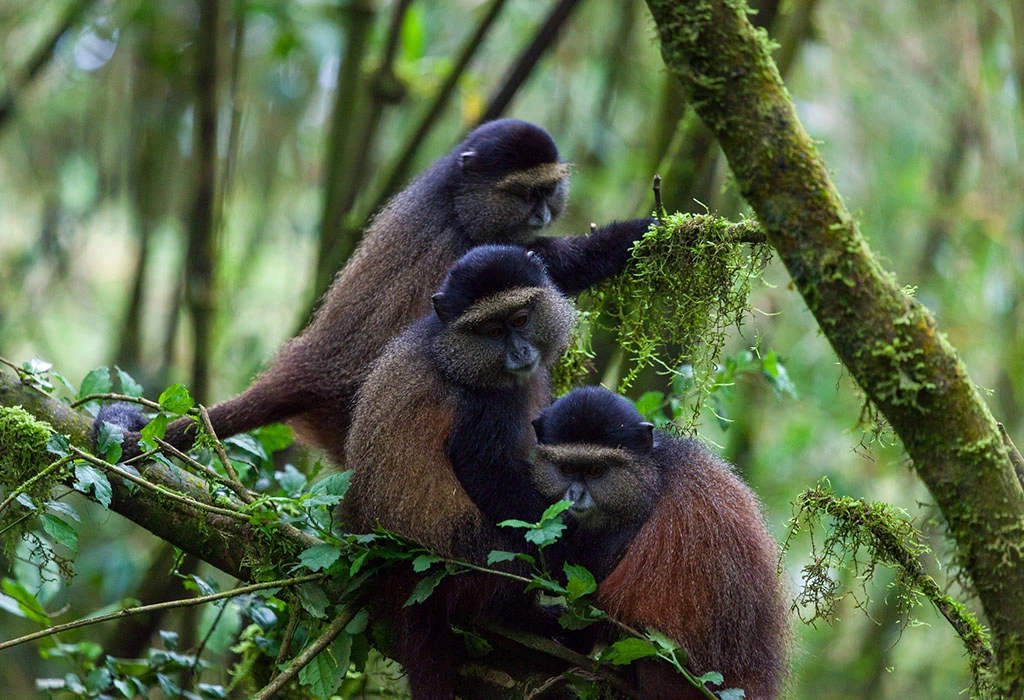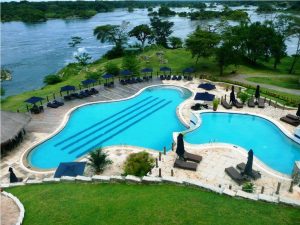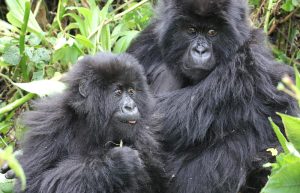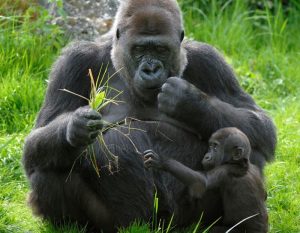Where Do Golden Monkeys Live?
Golden monkeys (Cercopithecus kandti) are a rare and fascinating species, prized for their vibrant golden fur and playful nature. These primates, however, are more than just a visual spectacle—they are also a critically endangered species with very specific habitat needs. If you’re wondering where golden monkeys live, how their habitat impacts their survival, and what’s being done to protect them, you’re in the right place. Let’s dive into the details of their unique habitat and why it’s so crucial for their continued survival.
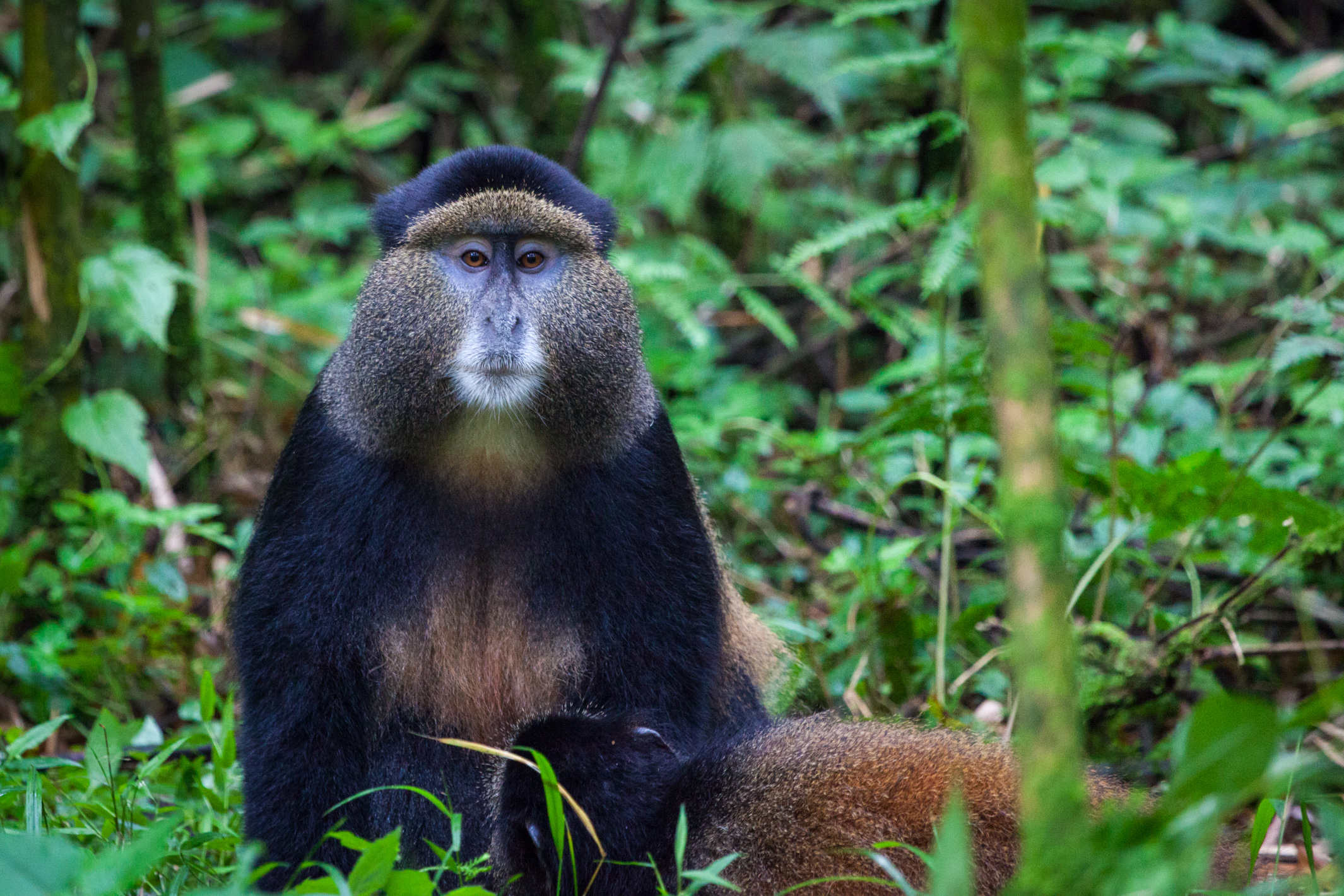
What is the Geographic Distribution of Golden Monkeys?
Countries Where Golden Monkeys Live
Rwanda: The most popular destination for golden monkey trekking is Volcanoes National Park in Rwanda, which is located in the northern part of the country.
Uganda: In Uganda, golden monkeys inhabit Mgahinga Gorilla National Park, a small but rich park that sits along the borders of Rwanda and the DRC.
Democratic Republic of Congo (DRC): Golden monkeys are also found in Virunga National Park, one of Africa’s most biologically rich parks, although the park has faced challenges due to political instability.
What Types of Habitats Do Golden Monkeys Prefer?
Golden monkeys live in high-altitude, dense forests, particularly those rich in bamboo vegetation. They thrive in the bamboo forests of the Virunga Mountains, where the environment offers both food and shelter.
These forests typically grow at altitudes between 2,400 meters (7,874 feet) and 4,000 meters (13,123 feet) above sea level. At these heights, the climate stays cool, and mist often blankets the forest, creating an ethereal atmosphere that draws trekkers to the region.
Why Bamboo Forests Are Essential
Bamboo is not only a beautiful feature of these forests but also the primary food source for golden monkeys. They feed on bamboo leaves, shoots, and stems, making bamboo forests a vital part of their ecosystem. Bamboo is also a resilient plant, thriving in the cool, moist climate of the Virunga Mountains, providing a steady and reliable source of nourishment for the monkeys.
What Elevation and Climate Do Golden Monkeys Live In?
Golden monkeys thrive in the highland regions of the Virunga Mountains, where cool, moist climates prevail. They inhabit some of the most elevated and remote parts of the range, making it one of the world’s most unique ecosystems.
The cool, misty weather at high altitudes protects golden monkeys from the harsh sunlight and heat found at lower, warmer elevations. The region also provides a constant supply of fresh water, essential for their survival.
Over thousands of years, golden monkeys have evolved to thrive in these conditions. Their thick fur coats shield them from the cool mountain air, and their agility helps them navigate the rugged, mountainous terrain with ease.
Why Do Golden Monkeys Live in Bamboo Forests?
Bamboo forests play a crucial role in the survival of golden monkeys. They provide a consistent food supply, as golden monkeys primarily feed on young bamboo shoots and leaves. These forests also offer a variety of additional food sources, including fruiting plants and insects, enriching the monkeys’ diet.
Beyond food, bamboo forests serve as a natural shelter. The dense vegetation protects golden monkeys from predators, giving them ample cover to stay hidden. Their agility allows them to navigate the trees and forest floor with ease, enabling quick escapes from potential threats.
Social Behavior and Habitat Use
Golden monkeys are highly social animals, living in family groups that range in size from several individuals to over 30. These groups spend most of their time foraging for food and socializing. The bamboo forest provides ample space for the groups to move around, forage, and interact with each other, ensuring they can thrive in their natural environment.
Additionally, the structure of the bamboo forest helps provide the shelter they need, with dense cover for sleeping and nesting at night.
What Threats Do Golden Monkeys Face in Their Habitat?
Despite the relatively stable habitat of the Virunga Mountains, golden monkeys face numerous threats that endanger their survival:
Deforestation and Habitat Loss
The most significant threat to golden monkeys is deforestation due to human activities, including agriculture, settlement expansion, and illegal logging. As more people move into the Virunga region, large swathes of bamboo forests are being cleared to make way for farming and construction. This fragmentation of their natural habitat is reducing the amount of space available for the monkeys to live and forage.
Human Encroachment
The Virunga Mountains are home to many human populations, and their need for land, resources, and timber puts additional pressure on the golden monkey’s habitat. Poaching, though less common, also remains a threat, as humans sometimes target these animals for food or illegal trade.
Climate Change
Climate change is another threat affecting the golden monkeys. The changing weather patterns may alter the growth of bamboo forests or lead to more erratic weather events, disrupting the delicate balance of the ecosystem that supports the monkeys.
What Conservation Efforts Are in Place to Protect Golden Monkeys?
The good news is that there are ongoing conservation efforts aimed at protecting the golden monkeys and their habitat. Many of these efforts are focused on the Virunga region, which is a UNESCO World Heritage Site and is recognized for its global biodiversity value.
Protected Areas and National Parks
Golden monkeys are primarily protected in the following parks:
Volcanoes National Park in Rwanda
Mgahinga Gorilla National Park in Uganda
Virunga National Park in the DRC
These parks offer safe havens for golden monkeys and are managed to ensure that human activities do not interfere with their survival.
Tourism and Eco-Tourism
Eco-tourism has been a vital tool in the protection of golden monkeys. Trekking with rangers to observe the monkeys in their natural habitat provides both an economic incentive for local communities and a means of raising awareness about the importance of conservation.
Research and Monitoring
Ongoing research and monitoring programs have been established to study golden monkeys’ behavior, habitat use, and health, providing valuable data to guide conservation efforts and ensure the long-term protection of the species.
Why is It Important to Protect Golden Monkey Habitats?
Protecting the habitats of golden monkeys is crucial for both the species’ survival and the overall health of the ecosystem. These monkeys help maintain the biodiversity of the Virunga region, and their presence supports the health of the bamboo forests on which they depend.
Additionally, protecting these habitats benefits local communities by generating income through eco-tourism and the sustainable use of resources.
The Future of Golden Monkeys and Their Habitats
Golden monkeys are remarkable animals, and their habitats in the Virunga Mountains rank among the most ecologically unique places on Earth. Despite threats like deforestation, human encroachment, and climate change, hope remains. Through ongoing conservation efforts and responsible tourism, golden monkeys can continue thriving in their beautiful bamboo forest homes for generations.
Protecting their habitats ensures not only the survival of golden monkeys but also the preservation of one of Africa’s most treasured ecosystems. By supporting conservation initiatives, we contribute to a broader effort to safeguard the rich biodiversity of the Virunga Mountains.

